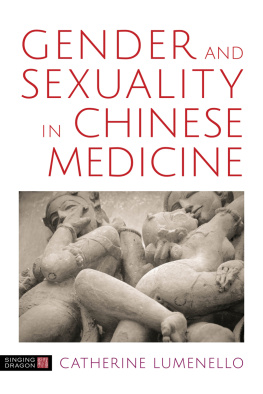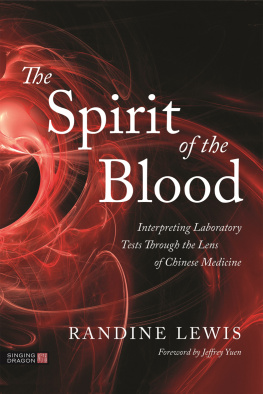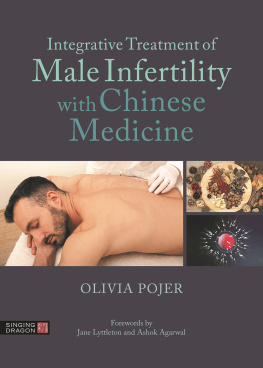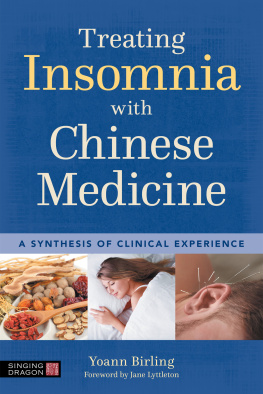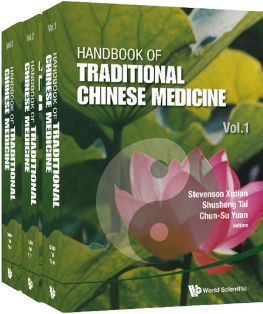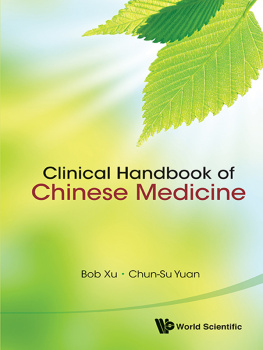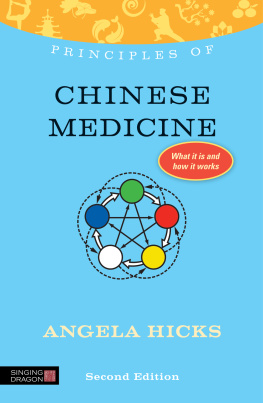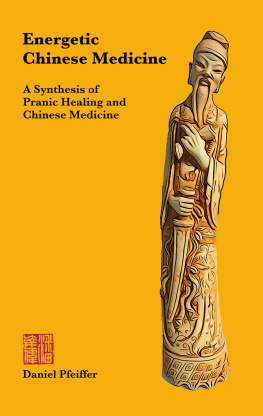
GENDER AND
SEXUALITY
IN CHINESE
MEDICINE
CATHERINE LUMENELLO

Contents
Disclaimer
The information in this book is designed for healthcare professionals well versed in Chinese Medicine and the tradition of Acupuncture. There is no one Chinese Medicine methodology preferred over any other for concerns related to gender and sexuality. In fact, this book blends Classical, Five Element (Five Phases, Wu Xing ), Japanese, Medical Qigong, and TCM diagnosis concepts with both well-known (Acupuncture, Herbs, Tuina) and the more esoteric (Essential Oils, Gemstone Therapy) modalities of Chinese Medicine. It is assumed that the reader:
is proficient in the differential diagnosis techniques particular to their tradition
will prioritize individual evaluation of any client, including overall health and Constitution, over printed theory to determine the most appropriate treatment principles and modalities
will thoroughly research any modalities with which they are unfamiliar before recommending or practicing them (see Bibliography)
will consider the treatment options provided throughout this book as examples rather than a prescription for any given condition.
CONDITIONS OF THE SPIRIT
Regardless of the presence of physical symptoms, many issues related to gender and sexuality are considered Spirit conditions. When developing a comprehensive treatment plan, the importance of psycho-spiritual etiology affects choice of modality, point selection, needle insertion technique, length of treatment session time, and intention-setting. For example, treating Blood Deficiency caused by emotional stress with nourishing Herbal Formulae and Diet is important, but inviting the client to recognize just how much stress their psyche is subject to (the true cause for depletion of the Blood) is the real key to full recovery.
OVERTREATMENT
Throughout this book is a note to avoid excessive or over treatment of the Extraordinary Vessels. Practitioners are reminded that any acu-point and its associated channel can be damaged by either aggressive technique or frequent use, so reverence for the power of any point is appropriate.
Extraordinary Vessels are special, as they serve as the reservoirs for Yin, Yang, Qi, and Blood. Damage to these structures can come from the aggressive or frequent needling already mentioned, or it may arise from asking them to mobilize when they are too deficient to offer assistance. An example of this is to needle the Ren Mai when there is already a system-wide Yin Deficiency. A better initial approach would be a combination of Essential Oils, Gemstones, Herbal Formulae, Diet, and Qigong to nourish and stabilize the overall Yin substances before stimulating the Vessel with Acupuncture.
Notes on the Text
TERMINOLOGY
Choosing a simplified term that refers to multiple communities with various needs was not easy. Diverse Gender and Sexuality (DGS) was selected to represent the many facets of gender, sexuality, and relationship choices as a method of inclusion, but it is not meant to imply that the unique concerns of each individual are the same as any other.
ABBREVIATIONS
Throughout the text, abbreviations are used to refer to various channels, including:
Extraordinary Vessel EV
Lung LU
Large Intestine LI
Stomach ST
Spleen SP
Heart HT
Small Intestine SI
Urinary Bladder UB
Kidney KI
Pericardium PC
San Jiao SJ
Gallbladder GB
Liver LV
Preface
I come to this project after 15 years specializing in severe emotional stress and Trauma recovery, with extensive experience working in the LGBTQ+, BDSM, and polyamorous communities. I have also taught at two Chinese Medicine schools in the United States, and independently taught Qigong for self-cultivation and external healing. In each of these settings Ive witnessed deep yearning for unbiased, frank, and empowering information about gender, sex, sexuality, and relationship. After fielding hundreds of questions from clients, colleagues, and students of all gender and sexual identities, this text covers many of the questions I was asked, as well as some that no one dared speak out loud.
As a child growing up in the 1970s and 1980s, there were no popular books, television shows, advertisements, or movies with two mommies, consensual triads, or gender-diverse individuals. Raised in New England (which remains steeped in the anti-sexual morality of Puritanism), there simply were no informed discussions or language debates around sexuality. I first heard the term bisexual in my late teens, and only with extensive searching discovered queer in my mid-20s. It wasnt until my mid-30s that I met an openly polyamorous person, and shortly thereafter attended my first event at a BDSM club. With lack of language and exposure to these concepts in my youth, realizing my own identities has not been an easy process and the ability to discuss sex openly is a skill Ive slowly achieved. Unburdened contemplation of gender and sexuality issues was simply not part of my formative years, just as it had not been for generations before me.
But this has changed.
We are in the midst of an unprecedented era of human history. A large portion of humanity now has the opportunity to consider life beyond their daily survival needs, along with access to an international community of opinion. The open-mindedness of American, European, and certain indigenous cultures has spread across the globe, penetrating even the most remote and conservative populations. From the comfort and privacy of their living rooms, millions can dip their toes in the palace of Travel and Adventure to help broaden their perspective, and many are using this window to delve into the most important of spiritual questions: Who am I?
The quest for self-actualization is not unique to individuals from the Diverse Gender and Sexuality (DGS) communities, but the opportunity for every person to express their thoughts and desires is a very recent phenomenon. The increasing visibility of DGS perspectives obviously brings more possibility to explore, but it has also stirred intense backlash and unfortunate reminders that prejudice has not been eliminated from our own communities. As issues of gender, sex, sexuality, and relationship continue to expand within the global consciousness, Chinese Medical professionals must compassionately embrace each persons journey into these fundamental aspects of existence. Open-hearted acceptance will not only allow all our clients to express their truest selves, but will also keep the profession at the forefront of holistic medicine worldwide.
To best serve the wide spectrum of human experience, the first section of this text identifies changes that are necessary within the practice of Chinese Medicine. Each of us has likely been raised with cultural bias, so we must simultaneously learn to be better allies and agree to eliminate professional practices that can easily cause physical or emotional harm. The second section examines binary thinking and gender constructs through YinYang theory, the Three Treasures, and the spiritual journey of the Nine Palaces, with a chapter dedicated to gender transitioning concerns. In the third section, sex, sexuality, and relationship come to the forefront, with a thorough overview of sexual energetics and the basics of sexual and emotional attraction, as well as individual chapters dedicated to sex-based health concerns and relationship power dynamics.
The most important section may be the last, which examines emotional etiology. As Chinese Medicine practitioners, we know that all chronic disease involves emotion , so as international violence and persecution remains on-going, it is critical to consider emotional etiology (including Secrecy, Repression, etc.) for every individual regardless of their current or assumed identity . Although this book does not specifically address issues of intersectionality among minority populations (such as women, people of color, and those adversely impacted by classism), the concepts presented regarding the role of cultural oppression in the creation of emotional etiology certainly apply.
Next page
